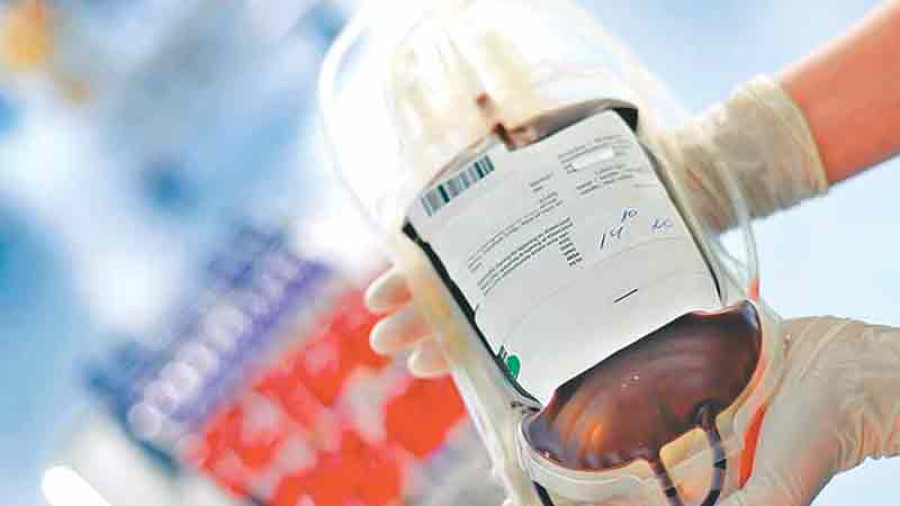Health
Central Blood Transfusion Service to urge local level to run blood donation campaigns
Provincial and local authorities agreed to provide free blood, which is always scarce in Kathmandu Valley.
Arjun Poudel
A nine-month-old baby was scheduled to undergo heart surgery at Shahid Gangalal National Heart Centre on Monday. Doctors at the hospital had asked his parents to arrange for three pints of AB-positive blood and clarified that they could only start surgery after the blood had been managed.
The parents, who were from Bagmati Province, thought that finding blood in Kathmandu would not be a problem, as they knew that the Central Blood Transfusion Service (CBTS), also known as the Blood Bank, is in the Capital. Besides, the provincial government had decided to supply free blood to all needy patients from Bagmati.
“They first approached CBTS and then to various blood banks in the Valley but could not get it,” said Prem Sagar Karmacharya, president of the Nepal Voluntary Blood Donors’ Society. “Then they approached me for help. I contacted several donors and helped them to arrange blood.”
The provincial health ministry has decided to provide free blood to all needy patients from the province. For that, the ministry signed an agreement with the CBTS and several hospitals in Bagmati Province. As per the agreement, the ministry will bear all screening charges for the blood, and the blood bank will supply it to the needy people without a fee.
Blood transfusion cost ranges from Rs810 to a maximum of Rs1,640 per unit.
The Kathmandu Metropolitan City also has decided to provide free blood to patients from the metropolis and pay screening costs for the blood of patients from its jurisdiction.
However, the problem is that blood is always scarce in Kathmandu Valley.
“Every day, I get over a dozen phone calls from desperate relatives of critically ailing patients,” said Karmacharya. “Providing free blood is a good thing, but when we do not get blood in an emergency, what to do with the free scheme?”
Officials at the CBTS agreed that one might not get blood during an emergency even if the provincial and local governments agreed to pay the screening charge.
“We all know that blood cannot be manufactured in a factory or purchased from the market,” said Sanjeev Kumar Yadav, senior technical officer at the CBTS. “Without sufficient donation, blood supply cannot be ensured. We request the agencies concerned to organise blood donation programmes.”
Officials at the CBTS said they have been planning to request local governments to organise more blood donation programmes and encourage volunteers from the respective local units to donate blood regularly so that the life-saving fluid can be provided to the needy free of charge.
‘We have recently signed an agreement with provincial authorities and the local level to supply free blood to patients,” said Yadav. “We have stopped charging patients for screening but for a smooth supply, the help of authorities is essential.”
The demand for blood has increased in Kathmandu Valley over the last several years, as along with the number of hospitals, major surgeries have also increased, leaving blood banks scrambling to respond to those approaching for blood.
To manage the growing crisis, blood bank staff ask relatives of patients to provide the bank with a replacement. When the blood bank asks for replacement, those from outside the Valley find themselves in big trouble if their relatives are admitted to the hospital and need blood.
Yadav said his office has requested social organisations, financial institutions and other professional bodies to conduct blood donation programmes.
As Nepal’s biggest festival, Dashain, has already started and Tihar is around the corner, the frequency of blood donation programmes will naturally decline. This could exacerbate the problem.
Karmacharya said that blood donation campaigns have faced a sharp decline in the last few years. An increasing number of young, healthy donors leaving the country for foreign employment, along with a rise in patients with high blood pressure, blood sugar, and thyroid—who are ineligible to donate blood—has led to the current state of affairs, blood bank officials said.




 9.7°C Kathmandu
9.7°C Kathmandu















